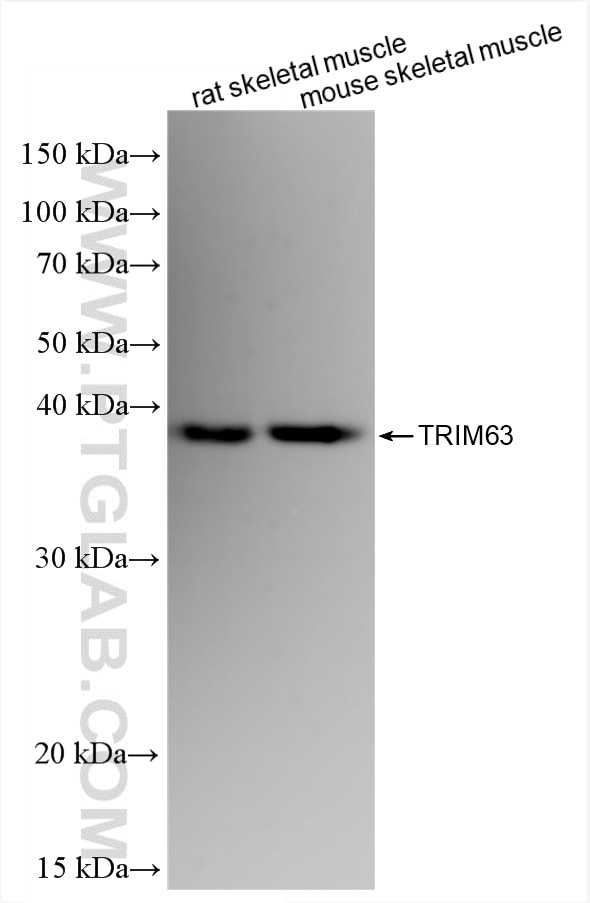TRIM63 Rekombinanter Antikörper
TRIM63 Rekombinant Antikörper für WB, ELISA
Wirt / Isotyp
Kaninchen / IgG
Getestete Reaktivität
human
Anwendung
WB, ELISA
Konjugation
Unkonjugiert
CloneNo.
242055A4
Kat-Nr. : 82345-4-RR
Synonyme
Geprüfte Anwendungen
| Erfolgreiche Detektion in WB | Ratten-Skelettmuskelgewebe, mouse skeletal muscle |
Empfohlene Verdünnung
| Anwendung | Verdünnung |
|---|---|
| Western Blot (WB) | WB : 1:500-1:2000 |
| It is recommended that this reagent should be titrated in each testing system to obtain optimal results. | |
| Sample-dependent, check data in validation data gallery | |
Produktinformation
82345-4-RR bindet in WB, ELISA TRIM63 und zeigt Reaktivität mit human
| Getestete Reaktivität | human |
| Wirt / Isotyp | Kaninchen / IgG |
| Klonalität | Rekombinant |
| Typ | Antikörper |
| Immunogen | Peptid |
| Vollständiger Name | tripartite motif-containing 63 |
| Berechnetes Molekulargewicht | 40 kDa |
| Beobachtetes Molekulargewicht | 40 kDa |
| GenBank-Zugangsnummer | NM_032588 |
| Gene symbol | TRIM63 |
| Gene ID (NCBI) | 84676 |
| Konjugation | Unkonjugiert |
| Form | Liquid |
| Reinigungsmethode | Protein A purfication |
| Lagerungspuffer | PBS with 0.02% sodium azide and 50% glycerol |
| Lagerungsbedingungen | Bei -20°C lagern. Nach dem Versand ein Jahr lang stabil Aliquotieren ist bei -20oC Lagerung nicht notwendig. 20ul Größen enthalten 0,1% BSA. |
Hintergrundinformationen
TRIM63, also named as IRF, MURF1, RNF28 and SMRZ, is E3 ubiquitin ligase. It is regulates proteasomal degradation of cardiac troponin I/TNNI3 and probably of other sarcomeric-associated proteins. TRIM63 may play a role in striated muscle atrophy and hypertrophy by regulating an anti-hypertrophic PKC-mediated signaling pathway. It may regulate the organization of myofibrils through TTN in muscle cells. TRIM63 is in muscle-specific expression.
Protokolle
| PRODUKTSPEZIFISCHE PROTOKOLLE | |
|---|---|
| WB protocol for TRIM63 antibody 82345-4-RR | Protokoll herunterladen |
| STANDARD-PROTOKOLLE | |
|---|---|
| Klicken Sie hier, um unsere Standardprotokolle anzuzeigen |


